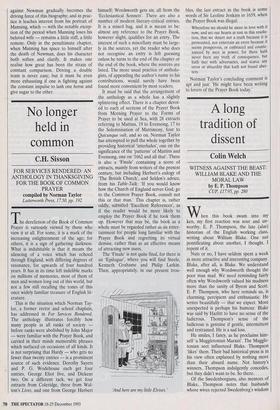No longer held in common
C.H. Sisson
FOR SERVICES RENDERED: AN ANTHOLOGY IN THANKSGIVING FOR THE BOOK OF COMMON PRAYER compiled by Norman Taylor Lutterworth Press, 17.50, pp. 192 The dereliction of the Book of Common Prayer is variously viewed by those who view it at all. For some, it is a mark of the increasing enlightenment of the age; for others, it is a sign of gathering darkness. What is indubitable is that it means the silencing of a voice which has echoed through England, with differing degrees of resonance, for upwards of four hundred years. It has in its time left indelible marks on millions of memories, most of them of men and women long out of this world, but not a few still recalling the tones of this once widely familiar treasure of English lit- erature.
This is the situation which Norman Tay- lor, a former rector and school chaplain, has addressed in For Services Rendered. The anthology illustrates forcibly how many people in all ranks of society before ranks were abolished by John Major — were familiar with the Prayer Book, and carried in their minds memorable phrases which surfaced on occasions of all kinds. It is not surprising that Hardy — who gets no fewer than twenty entries — is a prominent source of such evidence. Dorothy Sayers and P. G. Wodehouse each get four entries, George Eliot five, and Dickens two. On a different tack, we get four extracts from Coleridge, three from Wal- ton's Lives, and one from George Herbert
himself; Wordsworth gets six, all from the `Ecclesiastical Sonnets'. There are also a number of modern literary-critical entries. It is a mixed bag, and it is meant to be: almost any reference to the Prayer Book, however slight, qualifies for an entry. The interest of such a miscellany must be large- ly in the sources, yet the reader who does not recognise an entry is left guessing unless he turns to the end of the chapter or the end of the book, where the sources are listed. The more usual practice of antholo- gists, of appending the author's name to his contributions, would surely have been found more convenient by most readers.
It must be said that the arrangement of the anthology as a whole has a slightly splintering effect. There is a chapter devot- ed to each of sections of the Prayer Book from Morning Prayer to the Forms of Prayer to be used at Sea, with 28 extracts referring to Mattins, 19 to Evensong, 17 to the Solemnisation of Matrimony, four to Quicunque vult, and so on. Norman Taylor has attempted to pull the whole together by providing historical 'interludes', one on the significance of the 'patterns' of Mattins and Evensong, one on '1662 and all that'. There is also a 'Finale' containing a score of extracts, mainly from writers of the present century, but including Herbert's eulogy of `The British Church', and Selden's advice, from his Table-Talk: 'If you would know how the Church of England serves God, go to the Common Prayer Book, consult not this or that man.' This chapter is, rather oddly, subtitled 'Excellent References', as if the reader would be more likely to employ the Prayer Book if he took them up. However that may be, the book as a whole must be regarded rather as an enter- tainment for people long familiar with the Prayer Book and regretting its virtual demise, rather than as an effective means of attracting new users.
The 'Finale' is not quite final, for there is an 'Epilogue', where you will find Steele, Kenneth Grahame and Philip Larkin. Then, appropriately, in our present trou- And here are my little Elvises.' bles, the last extract in the book is some words of Sir Leoline Jenkins in 1659, when the Prayer Book was illegal:
Wherefore we should be more in love with it now, and set our hearts at rest in this resolu- tion, that we desert not a truth because it is persecuted, nor entertain an error because it seems prosperous, or embraced and counte- nanced by men in power; for there hath never been any truth of consequence, but hath met with adversaries, and scarce any error or absurdity that hath not found abet- ters.
Norman Taylor's concluding comment is apt and just: 'He might have been writing to lovers of the Prayer Book today.'










































































































 Previous page
Previous page